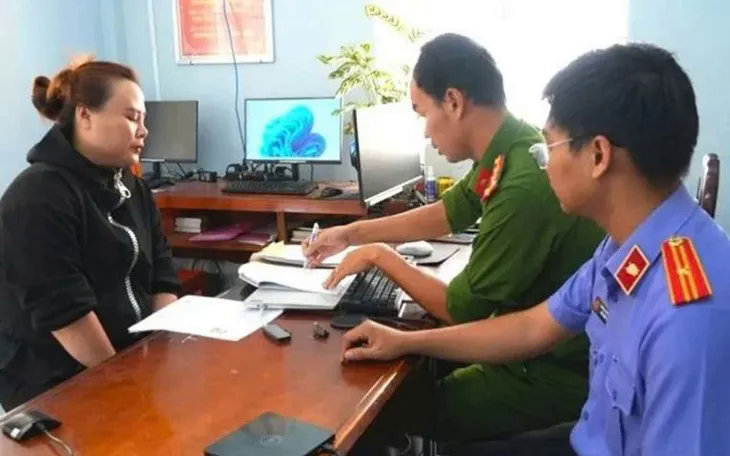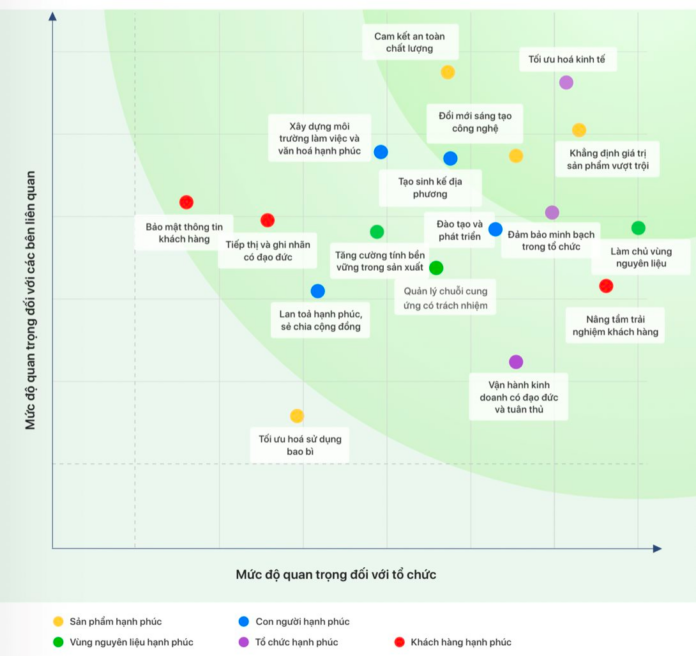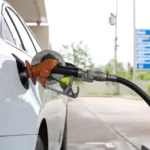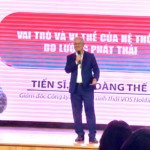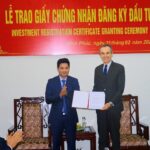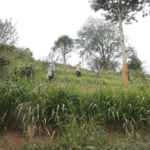“Pay up or reduce emissions: The discussion among exporters, associations, and more at a recent ESG workshop.”
The EU is currently working towards becoming a carbon-neutral continent by 2050. To achieve this ambitious goal, it is developing strategies to prevent “carbon leakage,” where EU businesses might shift their emissions outside of Europe, ultimately undermining global climate neutrality ambitions.
To address this challenge, the EU has introduced the Carbon Border Adjustment Mechanism (CBAM), which will come into effect in October 2023. From January 1, 2026, the CBAM will be fully implemented, presenting a new challenge for exporters, particularly in the manufacturing sector. Businesses will need to either reduce their emissions according to global green standards or pay carbon taxes to access major markets like the EU and the US.
The current requirement for exporters is to consider emission reduction across their entire supply chain, from procurement to distribution.
Experts believe that meeting emission reduction targets is a significant pressure for many businesses, especially with the imminent implementation of CBAM. As evidence, a manufacturing company shared that they were required to provide a CBAM report by their European importer, without which they would not be able to export their products.
In reality, many Vietnamese businesses, particularly larger enterprises, have already embarked on a journey towards sustainability. This includes obtaining sustainability certifications, creating happy and gender-equal work environments, and reducing industrial waste.
How are Vietnamese Businesses Embracing the Green Transition?
A glance at the sustainability stories of listed companies from diverse sectors, including insurance, commercial banking, and leading manufacturers like Vinamilk, Century Yarn, Cà Mau Fertilizer, and GC Food, reveals the publication of annual Sustainability Development Reports. These reports outline specific percentages of waste reduction in their operations and the corresponding business efficiency gains.
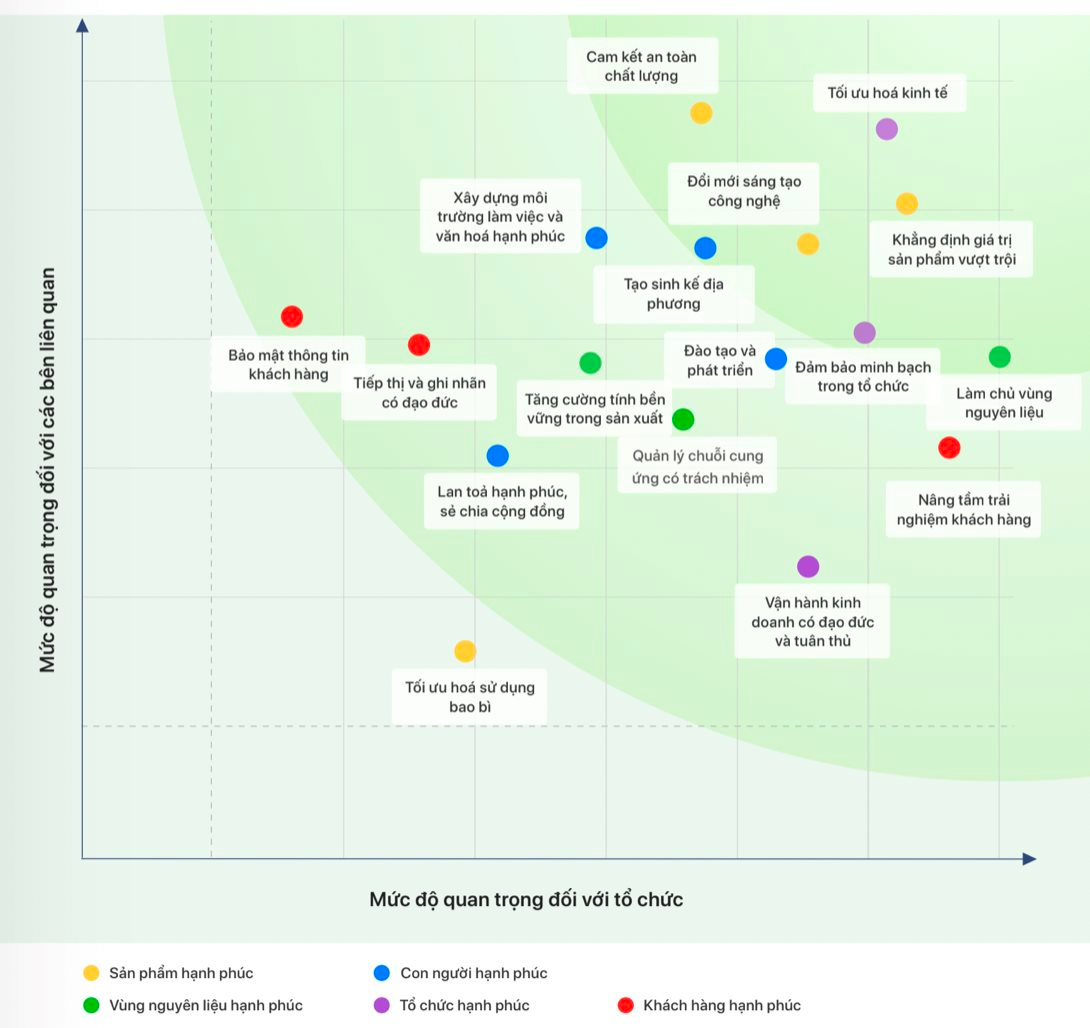
Matrix of focal points in GC Food’s Sustainability Report.
For instance, in GC Food’s inaugural Sustainability Report, they noted:
“By implementing a sustainable development strategy, the company’s output in 2024 increased by 28,000 tons, a 27% surge compared to 2023. GC Food also achieved a 12% reduction in energy consumption during production, a 15% savings in clean water usage, an approximate 8% decrease in greenhouse gas emissions, and over 60% of products using recycled or biodegradable materials, aiming for a 20% reduction in single-use plastic packaging by 2026.”
GC Food, dubbed the “Aloe Vera King of Vietnam,” reported producing 15,000 tons of aloe vera and over 11,834 tons of coconut jelly in 2024. They currently export to 22 countries, with more than 80% of their coconut jelly production dedicated to exports, serving prominent buyers in Europe, and capturing 8% of the aloe vera market share in South Korea and 9% in Japan.
Exporting to 132 Markets and Navigating the Most Stringent Standards: The Challenge of Water for the Textile Industry
According to the Vietnam Textile and Apparel Association, Vietnamese businesses are heavily investing in greening their operations, focusing on solutions like wastewater treatment, waste recycling, and emission reduction.
“The textile industry exports to 132 markets globally, each with its own unique standards. Among these, water standards are mandatory and strictly monitored,”
shared Mr. Vu Duc Giang, Chairman of the Vietnam Textile and Apparel Association.
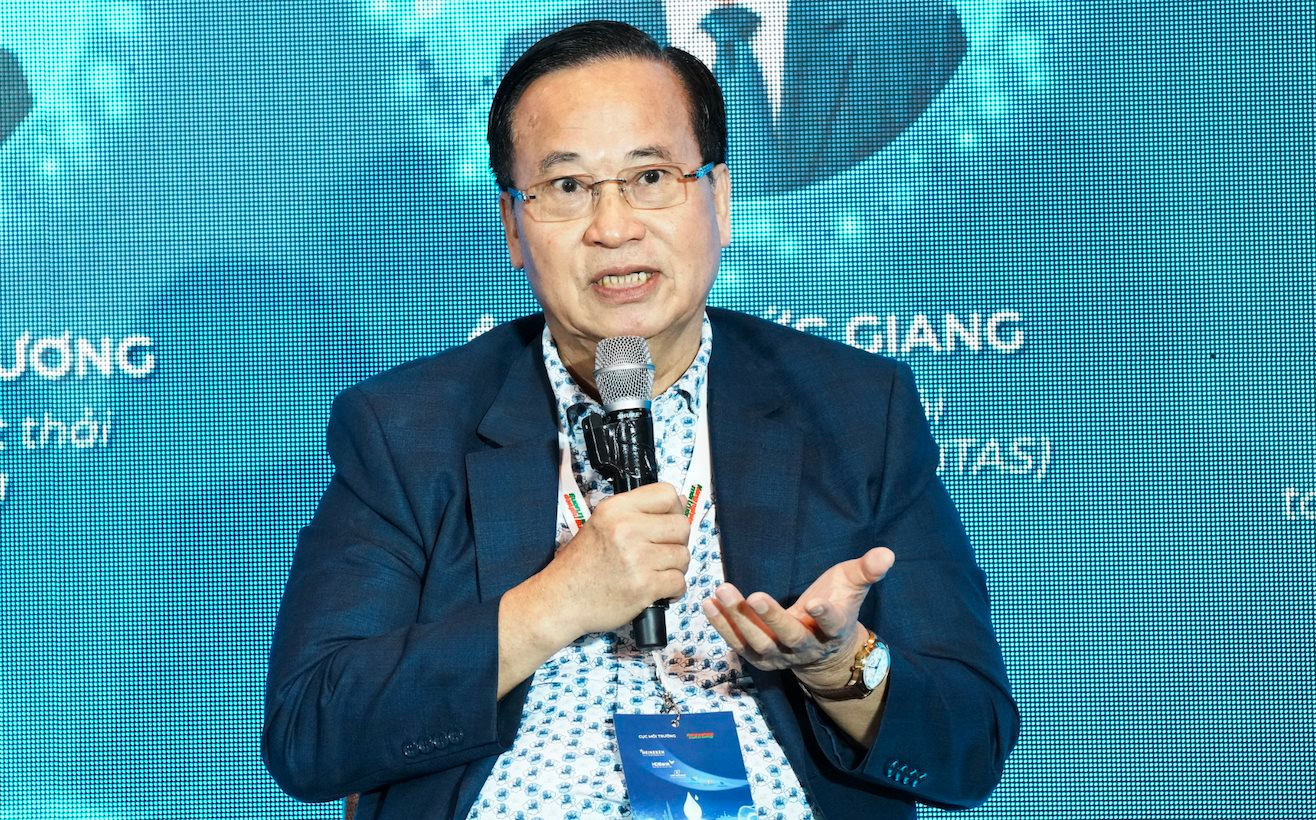
Mr. Vu Duc Giang, Chairman of the Vietnam Textile and Apparel Association.
To tackle this challenge, Mr. Giang emphasized the imperative for industrial parks and businesses to invest in rainwater harvesting infrastructure. Obtaining certification from local authorities for rainwater collection and conservation is a significant advantage for businesses and their brands.
He also highlighted that businesses are no longer waiting for government pressure. Instead, their biggest incentive is their global customers. Failure to meet these standards means exclusion from the international playing field.
According to a report by the Ministry of Agriculture and Environment, 94.1% of operating industrial parks in Vietnam have built centralized wastewater treatment systems that meet standards. However, this figure is only 31.5% for industrial clusters, indicating room for improvement. Additionally, wastewater treatment technology is not yet standardized, and investment and operating costs remain a significant barrier.
Another issue pertains to gender equality, especially in labor-intensive industries like textiles and footwear, where female workers constitute 70-80% of the workforce, yet only 30% of leadership positions are held by women.
It is worth emphasizing that, in the last year or two, gender equality and a “happy” work environment have become top sustainability criteria for European partners. The EU has developed strategies, policies, legal frameworks, and organizations to promote gender equality, including integrating gender perspectives into various policies.
A Happy and Inclusive Work Environment: Boosting Productivity and Retaining Gen Z
Mr. Le Quang Binh, Director of ECUE Vietnam and representative of GEARS@VIETNAM, shared:
“Research shows that Vietnamese women spend approximately three more hours on household chores than men daily. This impacts their opportunities, energy, and time for career advancement.”
GEARS is an Australian government initiative developed by Investing Woman to support businesses in their sustainable development journeys, with a social focus on gender equality in the workplace. The program collaborates with two partners in Vietnam: ECUE and BSA.
Reports from GEARS@VIETNAM reveal:
(i) Businesses with gender diversity and an inclusive environment demonstrate tenfold higher work efficiency compared to those without,
(ii) Group creativity can increase by up to nine times, and customer service capabilities improve fivefold,
(iii) Businesses with gender diversity in the top 25% can achieve 15% higher profits than the industry average.
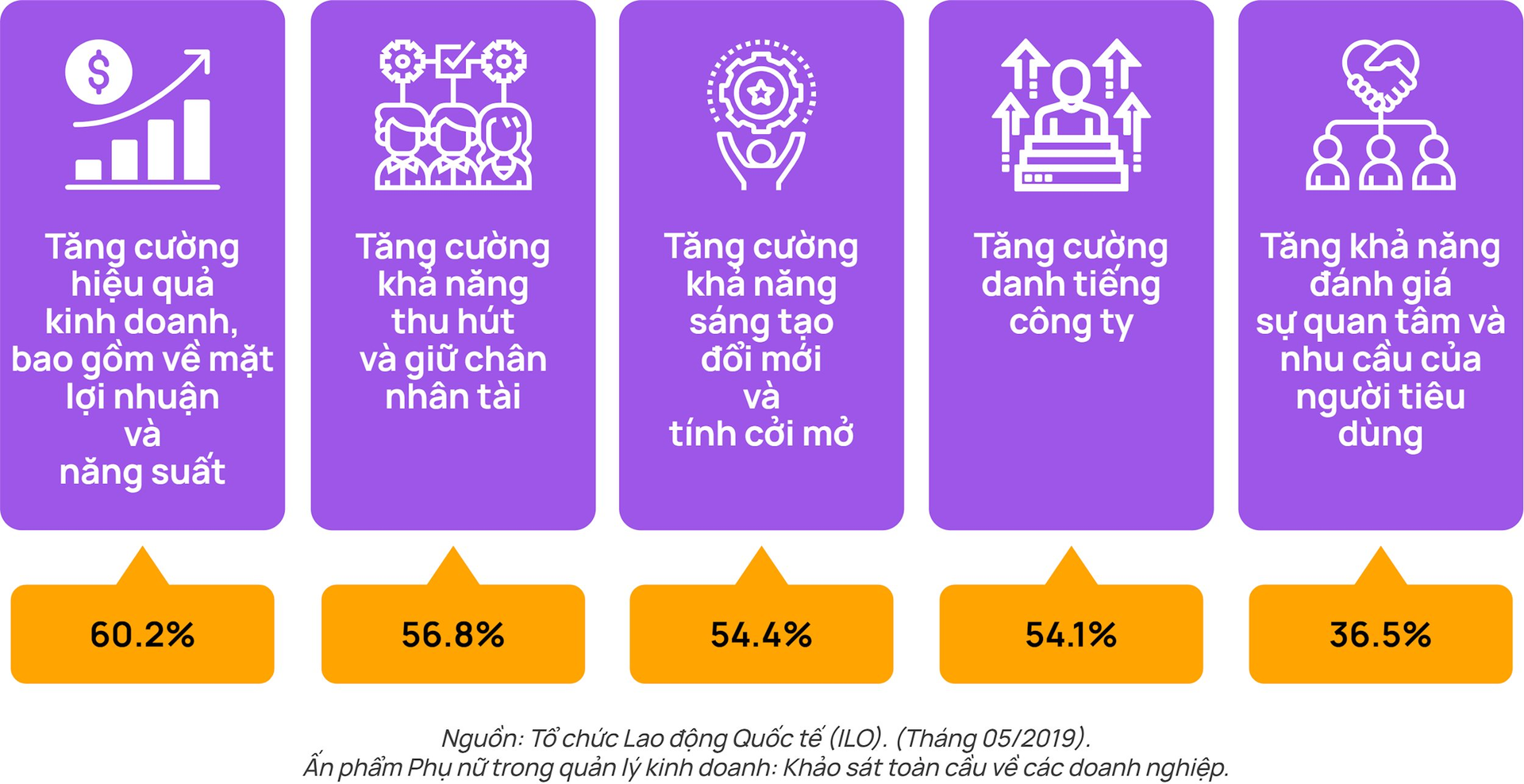
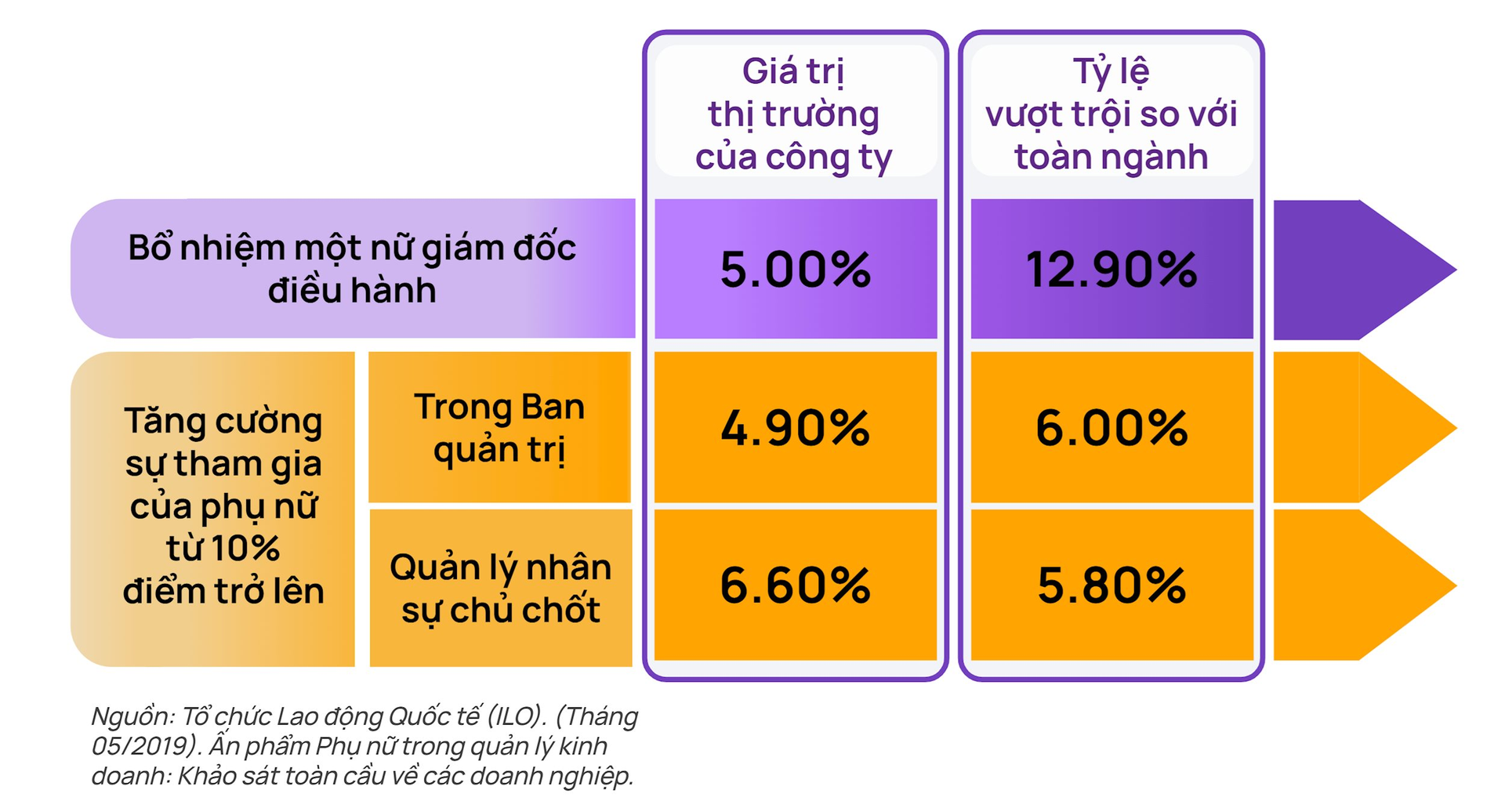
Mr. Binh also emphasized the importance of a happy and inclusive work environment in attracting and retaining Gen Z talent, a group that constitutes an increasingly dominant segment of the workforce.
“Gen Z seeks a workplace that not only offers competitive salaries but also embraces inclusivity, respects human dignity, and allows them to be their authentic selves. They possess a strong value system,”
he added.
In Thailand, for instance, 75% of employees stated they would consider leaving their jobs if the work environment lacked respect and inclusivity. Thus, creating an inclusive culture is essential for attracting top talent, especially the younger generation.
Overall, many Vietnamese businesses have begun prioritizing improvements in their work environments, particularly in gender equality and female leadership empowerment.
Carbon Credit Sales: Empowering Farmers to Prosper
Ecological agriculture and circular farming are not just methods of cultivation, but a philosophy that strives for long-term sustainability for both people and the planet. With a shared goal of achieving Net Zero by 2050, Vietnam’s agricultural sector is undergoing a transformation towards ecological farming practices to protect natural resources and community health, paving the way for a green, clean, and resilient future.
Electrifying Sustainability: Revving Up the Electric Vehicle Production Line
Supplying cutting-edge technology, production lines, and innovative solutions, Bühler Group is at the forefront of sustainable electric vehicle manufacturing in Vietnam and beyond. By reducing resource wastage, minimizing emissions, and optimizing production processes and costs, the company is paving the way for a greener future.







